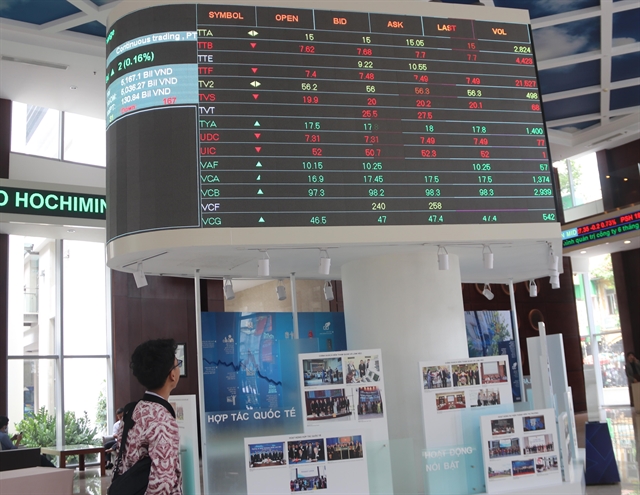Even though foreign investors have become net sellers on the stock market, they have fled to bonds and are waiting for future investment opportunities, said Tran Van Dung, Chairman of the State Securities Commission of Viet Nam (SSC).

Even though foreign investors have become net sellers on the stock market, they have fled to bonds and are waiting for future investment opportunities, said Tran Van Dung, Chairman of the State Securities Commission of Viet Nam (SSC).
In the first nine months of the year, foreign investors net sold nearly VND30.2 trillion (US$1.3 billion) on the country’s stock market. Of which, foreign investors net sold over VND40.3 trillion of shares and net bought VND10.1 trillion of bonds.
Compared to the international market, the net sold value of foreign investors on Viet Nam’s stock market is lower than that of other countries in the region.
In a press conference, the chairman of SSC said that the net selling was due to a number of factors such as the impact of COVID-19 and profit-taking on portfolios that have been disbursed in 2019 and 2020, after the stock market price surged.
However, he also said that foreign investors net sell on the stock market, but buy bonds and wait for further investment. Statistics showed that the cash proportion in the total portfolio value of foreign investors has remained relatively stable, which has been at high levels since the beginning of the year.
On the other hand, even though foreign investors withdrew capital from Viet Nam, the accumulated outflow value from the beginning of 2021 until now has only accounted for 0.8 per cent of the total portfolio value of foreign investors and lower than the net sold value of foreign investors on the stock market. This showed that the net selling activities of foreign investors are partly to restructure their portfolios, not entirely to flee from the market.
Viet Nam is holding many advantages to attract foreign capital as the COVID-19 pandemic can be well contained in the near future, Dung added.
They are significantly improved legal and business environment. The Law on Enterprises, the Law on Investment, and the Law on Securities, which were put into effect from 2021, have made the investment and business environment more transparent and complete.
Regarding the securities sector, many new regulations related to increasing the standards of goods on the stock market, enhancing information disclosure, improving conditions for issuance, listing and corporate governance, help the market develop sustainably, protecting the legitimate rights and interests of investors, and open many development opportunities for businesses.
Attract foreign capital flows
One of the investors’ concerns is the upgrade of the stock market. Obviously, this is a factor that positively affects foreign capital flows into the market.
As the country’s stock market is still a frontier market, many large investment funds in the world have not paid much attention or invested at a very limited level, Dung added. If the market is upgraded, there will be more capital from these funds, and at that time, investment cash inflows from abroad will increase in quantity and quality.
“We think in order to upgrade the Viet Nam’s stock market, it will need efforts and participation of the whole political system, especially from the Government and relevant ministries and sectors to stabilise the macro-economy, build a post-pandemic growth report and policy coordination to improve the investment environment," Dung said.
"Securities regulatory agencies need to build and develop products and services corresponding to practices of the emerging stock market, creating fairness for foreign investors in Viet Nam’s stock market."
In the short term, the SSC will focus on completing the guiding system for the Law on Securities, continuing administrative reform, and creating favourable conditions for investors to participate and invest, as well as diversify products.
The SSC will also strengthen supervision and inspection activities under new conditions, strictly punish violations to reinforce discipline and strengthen foreign investors' confidence in the country’s stock market, Dung said.
For the medium-term, the SSC focuses on improving the quality of goods through corporate governance and risk management. Moreover, it will gradually apply the accounting system according to international standards (IFRS).
In the long term, the SSC is developing a strategy for the stock market development during the 2021 - 2030 period to implement the Financial Strategy, which is being drafted by the Ministry of Finance. — VNS





